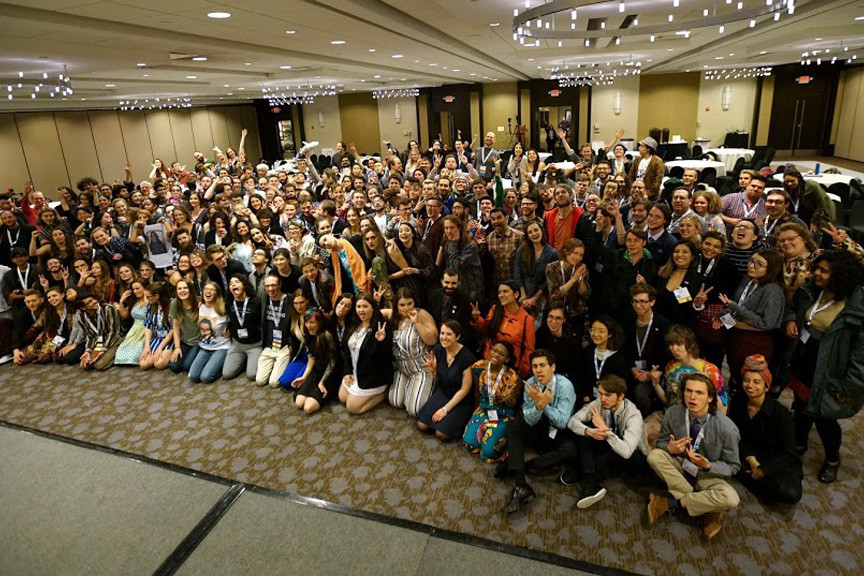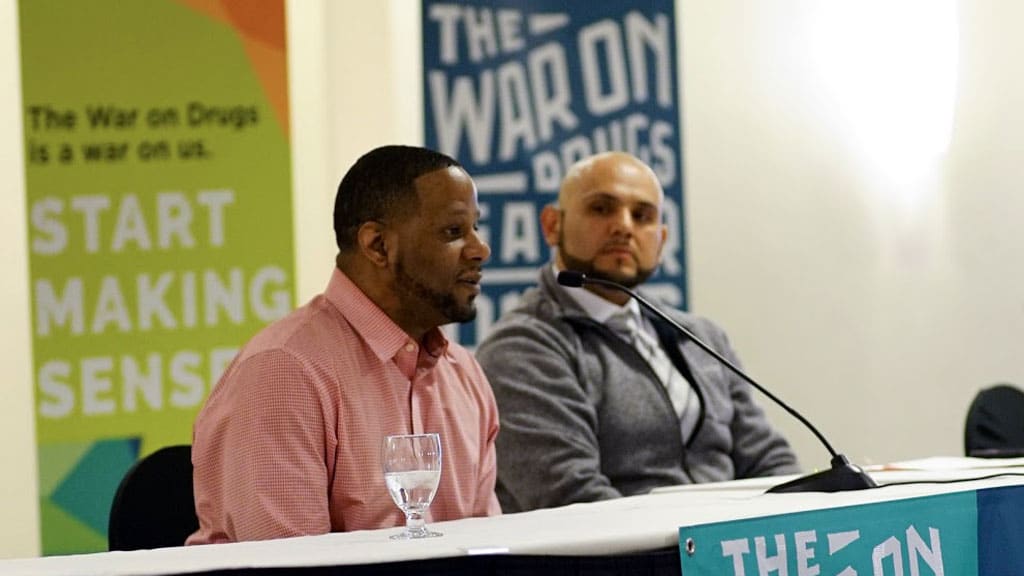Young People of Color As Leaders in The Movement To End the War on Drugs
How do you center the needs and perspectives of people of color in your activism—not because you want to fill a quota, but because the success of your work depends on it?

Psymposia is a 501(c)(3) nonprofit research and media organization that offers critical perspectives on drugs, politics, and culture. We rely on contributions from our readers and listeners. Your support is vital to sustaining Psymposia.
Support Psymposia’s independent journalism on Patreon and help us drive the Mystery Machine! We’re a bunch of meddling kids who are unmasking the latest shenanigans on the psychedelics beat.
How do you center the needs and perspectives of people of color in your activism—not because you want to fill a quota, but because the success of your work depends on it?
That was the question Antwan Jefferson Ph.D. asked me after we met in Chicago on March 30, 2019. Jefferson, an education and human development professor at the University of Colorado in Denver, visited the Windy City to present a lecture on racism and privilege at SSDP2019: The Global Students for Sensible Drug Policy Conference. Over three days, SSDP brought together a diverse crowd of students and activists, young and old, for their annual strategy meeting on how to end the War on Drugs.
Students for Sensible Drug Policy—formed in Rochester in 1998, now an international grassroots network in 33 countries with over 4,300 members and counting—is confronting the challenge of building an inclusive movement that prioritizes the needs of people of color and marginalized groups targeted by the War on Drugs.
This year’s conference in Chicago saw its first-ever People of Color Dinner and healing circle, where a diverse group of about 50 students, alumni and other supporters dug into a delectably savory meal (lemon butter tilapia?!) before digging deeper with an intimate reflection on their place in the drug movement.
“The SSDP network, from its student body to its staff, is primarily white, and has been since I first became involved in 2013,” said Oriana Mayorga, an SSDP alum, current Psymposia Community Outreach Director and a co-organizer of the dinner event. “This year, the Dinner and Healing Circle gave me hope, for the first time, to see all of us in a shared space. I hope to see this continued every year for as long as SSDP continues to exist.”
Mayorga and SSDP intern Logan Ward opened a group discussion about identity and inclusion. The SSDP in attendance shared stories about the insecurity, anxiety and confusion that comes with trying to understand their race, gender, and sexuality. There emerged a recognition that many of us don’t know how we relate to these ideas even within our own communities and families—but also a sense of camaraderie that we are not alone.
“I remembered how old I was when I was in that room,” Jefferson told me. “It was beautiful and encouraging and powerful to see that happen, and that environment should be a testing ground for how SSDP can do similar work.”
But Jefferson noted how at the event’s close, Mayorga urged the group to continue this conversation through more meetings and group phone calls. “That suggests this hasn’t been happening and is not important to SSDP as a whole, but only being prioritized by people of color within the organization,” he said.
For many reasons, SSDP has struggled to support people of color in the network, and that problem is complicated by their college campus chapter model. Levels of enrollment and retention in higher education institutions in the U.S. divide along racial lines, according to a 2017 Young Invincibles report.
While college enrollment rates out of high school are similar between White, Black and Hispanic students, Black and Hispanic students disproportionately enroll in for-profit and community colleges. These institutions are linked to poorer student outcomes, higher student debts, lower incomes after graduation and greater student loan defaults.
Minority students are also completing college and earning degrees at an increasingly lower rate compared to their white counterparts, and their education costs take up a greater share of their families’ income, the report found.
“Our education system in the States is very elitist and exclusionary, which makes it harder to recruit people of color to the organization,” said Jason Ortiz, an SSDP alum and current President of Connecticut Puerto Rican Agenda. He detailed how as an SSDP during his undergraduate years at the University of Connecticut, he struggled even to find other Puerto Ricans to partner with at the very white college.
But this doesn’t mean that people of color have no interest in the movement’s goals, he explained—quite the opposite. “SSDP now is international,” he said. “And we see when you have chapters around the world we do very well in places like West Africa and Mexico. When folks are present they do opt in to participate and be a part of SSDP.”
Where many SSDP agree is that while the organization and movement have a lot more work to do engaging with people of color, it has made significant progress over its twenty year lifespan. “I’ve noticed the demographic of the organization get incredibly more diverse, to the point where that dinner event on March 30 drew such a large crowd,” said Ismail L. Ali, Chair of the SSDP Board of Directors and involved since 2014.
“There was—and is—substantive outreach from SSDP toward a more diverse student body, including SSDP’s DARE committee, and the drug policy reform movement has become more mainstream which means that joining it is less stigmatized.” Ali referred to the Diversity Awareness Reflection and Education Project (DARE), SSDP’s committee which teaches its members how to better engage with underrepresented groups of people. It also provides scholarships for people experiencing hardships to attend SSDP events.
But the increased leadership of people of color in this movement is owed to more powerful forces than organizations like SSDP, Ali continued. The emerging debate in drug policy reform is not what to legalize, but how to legalize it. There is a huge demand for social equity in the legal cannabis industry, as states like California and Massachusetts set up statewide programs to fund and assist cannabis license applicants from communities disproportionately targeted by the War on Drugs. These issues, Ali said, are giving people of color an ever greater stake in the direction of drug policy reform.
But where is the line, Jefferson asks, between involving people of color in the activist goals you’re already pursuing, and making your activism centered on people of color? “We mistakenly assume that low income people and people of color should know that our work is meaningful to them,” he said. “We think, they should just show up, if we build it they will come. This reinforces the faulty idea that what people of color are missing, middle-class white people can give to them.”
Organizations like SSDP, he said, cannot just think that they already know what they need to do and others should join in. They have to approach their work with the understanding that without a diversity of voices, they are incapable of accomplishing their mission.
In the same weekend SSDP hosted their People of Color Dinner, they opened the three-day conference with a discussion on surviving the prison system and criminal justice reform from two formerly incarcerated men, Orlando “Chilly” Mayorga* and Marlon Chamberlain. (No relation to Oriana Mayorga.)

They also hosted the first-ever #MeToo discussion (co-organized by Oriana Mayorga), featuring personal testimony from four women detailing their experiences of sexual violence working in the drug policy reform movement.
Programming like this exists because the organizations’ grassroots base demands it. Vilmarie Fraguada Narloch, Drug Education Manager for SSDP, explained that SSDP is run by its Board of Directors comprised of students elected to it each year. The board oversees its staff and keep it accountable to the network’s needs, instead of a ‘top-down’ approach.
“We have a priority to ensure that drug policy reform does not happen without the voices of people of color and other minority groups at the forefront,” Fraguada Narloch said. “It is well-established that these folx have been the most disproportionately and negatively impacted by the War on Drugs.” Without their input, she said, drug policy reforms perpetuate inequalities in drug law enforcement, and the promises of social equity and community re-investment programs ring hollow.
The way forward, then for SSDP and similar organizations striving for real inclusion, may be simple: create more space, and give up the microphone. “Representation matters,” said Oriana Mayorga. “If we do not see people who look like us in positions of power in areas of interest, we internalize the belief that there is no place for us in this work. Without minority groups in the drug policy reform movement, the movement will continue to uphold white supremacy.”
Hey! Before you go… Psymposia is a 501(c)(3) non-profit media organization that offers critical perspectives on drugs, politics, and culture. We strive to ask challenging questions, and we’re committed to independent reporting, critical analysis, and holding those who wield power accountable.
Our perspectives are informed by critical analysis of the systemic crises of capitalism that have directly contributed to the unmitigated growth of addiction, depression, suicide, and the unraveling of our social relations. The same economic elite and powerful corporate interests who have profited from causing these problems are now proposing “solutions”—solutions which both line their pockets and mask the necessity of structural change.
In order for us to keep unpacking these issues and informing our audience, we need your continuing support. You can sustain Psymposia by becoming a supporter for as little as $2 a month.





